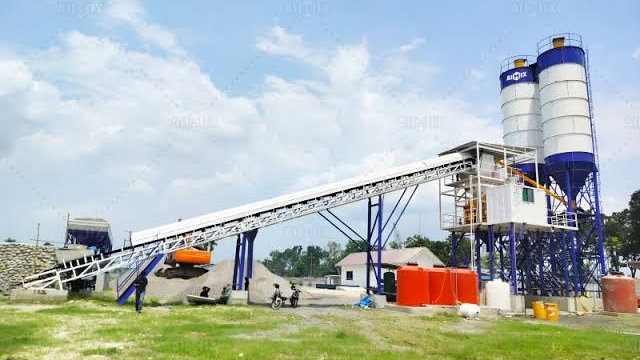

Concrete production is frequently water-intensive, with batching plants using several thousand liters per day for aggregate soaking, mixing and equipment washing. As the construction industry faces increased pressure to reduce its environmental effects, cutting-edge water management practices are important. AKP.HYMX has responded by incorporating cutting-edge water recycling technologies and promoting effective curing techniques, maintaining both productivity and sustainability.
Recycling of Water in Batching Plants
The batching plant uses a continuous water recycling system, which captures and processes water from a variety of sources, including equipment washing and aggregates wetting. This method allows for the reuse of up to 90-95% of water, significantly reducing relying on external water supplies and promoting sustainability.
Automatic Filtration and Recovery of Aggregates
The company uses automated filtration plants to remove solids from process water without using any chemical. These systems minimise material and water waste by separating aggregate like stone and sand for immediate reuse. Consistent water quality and efficiency in operation are assured by fully automated controls.
Reduction of Cost and Waste
During recycling processed water, it reduces the cost of disposal for concrete waste and the amount of waste sent to municipal sewage systems.
Automated Curing System
In order to provide uniform curing and avoid overuse waste, these systems make use of storage tanks, pumps, and adjustable pipes.
Alternative Techniques for Curing
One of the alternative technique is to help to retain moisture within the concrete, decreasing the need for frequent water usage and further protecting resources.
Comprehensive Sustainability Work
The water-saving efforts are a component of a larger commitment to sustainable development. The company is constantly investing in research and innovation to improve water efficiency throughout all operations, placing itself as a responsible leader in the construction sector.
Constant Improvement
Thre frequently reviews and updates is important and it should be, taken into account new technologies and feedback from plant managers and site teams. Water conservation is kept at the centre of its manufacturing philosophy through this culture of continuous improvement.
By combining cutting-edge recycling technologies with water efficient curing techniques, it shows that significant water savings are possible in the production of concrete. By focussing on sustainability, the company not only reduces its environmental impact, but also sets a standard for others in the industry.